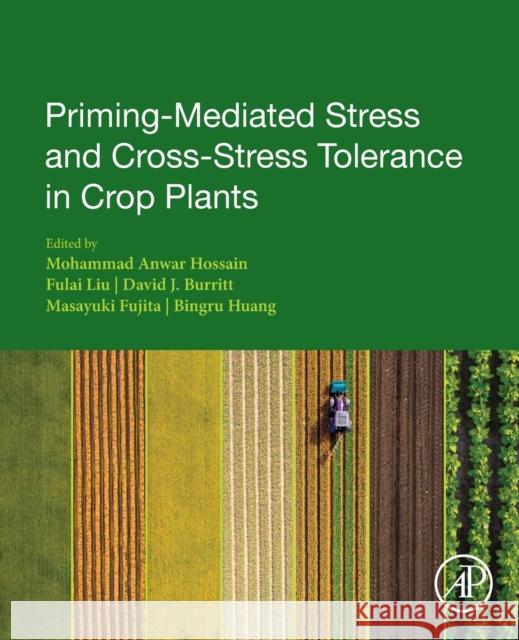Priming-Mediated Stress and Cross-Stress Tolerance in Crop Plants » książka



Priming-Mediated Stress and Cross-Stress Tolerance in Crop Plants
ISBN-13: 9780128178928 / Angielski / Miękka / 2020 / 362 str.
Priming-Mediated Stress and Cross-Stress Tolerance in Crop Plants
ISBN-13: 9780128178928 / Angielski / Miękka / 2020 / 362 str.
(netto: 550,41 VAT: 5%)
Najniższa cena z 30 dni: 570,87
ok. 30 dni roboczych.
Darmowa dostawa!
1. Priming mediated stress and cross-stress tolerance in plants: concepts and opportunities 2. Plant physiology and Molecular Mechanisms in Cross-regulation of Biotic-Abiotic Stress Responses 3. Getting ready with the priming: Innovative weapons against biotic and abiotic crop enemies in a global changing scenario 4. H2O2-retrograde signaling as a pivotal mechanism to understand priming and cross stress tolerance in plants 5. Induced resistance to biotic stress in plants by natural compounds: Possible mechanisms 6. Induction of plant resistance to biotic stress by priming with ß-aminobutyric acid (BABA) and its effect on nitrogen-fixing nodule development 7. Drought stress memory and subsequent drought stress tolerance in plants 8. Reactive nitrogen species mediated cross-stress tolerance in plants 9. Drought priming-induced heat tolerance: Metabolic pathways and and molecular mechanisms 10. Heat shock induced stress tolerance in plants: Physiological, biochemical and molecular mechanisms of acquired tolerance 11. Heat priming induces intra- and trans-generational thermo-tolerance in crop plants. 12. Induction of cross tolerance by cold priming and acclimation in plants: Physiological, biochemical and molecular mechanisms 13. Roles of reactive oxygen species in modulating cross tolerance in plants via flavonoids 14. Hydrogen sulfide: A novel signaling molecule in plant cross-stress tolerance 15. Plant transcriptional regulation in modulating cross-tolerance to stress 16. Molecular mechanisms regulating priming and stress memory 17. Abiotic and biotic stress interactions in plants: A cross-tolerance perspective 18. Seed priming-induced physiochemical and molecular events in plants coupled to abiotic stress tolerance: An overview 19. Cross-tolerance to abiotic stress at different levels of organizations: Prospects for scaling-up from laboratory to field
Dr. Mohammad Anwar Hossain is a professor in the Department of Genetics and Plant Breeding, Bangladesh Agricultural University, Mymensingh-2202, Bangladesh. He received his B.Sc. in Agriculture and M.S. in Genetics and Plant Breeding from Bangladesh Agricultural University, Bangladesh. He also received an M.S. in Agriculture from Kagawa University, Japan in 2008 and a Ph.D. in Abiotic Stress Physiology and Molecular Biology from Ehime University, Japan in 2011 through a Monbukagakusho scholarship. As a JSPS postdoctoral researcher he worked on isolating low phosphorus stress tolerant genes from rice at the university of Tokyo, Japan during the period of 2015-17. His current research interests include the isolation and characterization of abiotic stress responsive genes and proteins, physiological and molecular mechanisms of abiotic stress response and tolerance with special reference to oxidative stress, antioxidants and methylglyoxal metabolism and signaling, generation of stress tolerant and nutrient efficient plants through breeding and biotechnology, and cross-stress tolerance in plants. He has more than 50 peer-reviewed publications and has edited 8 books, including this one, published by CRC press, Springer, and Elsevier.
Affiliations and Expertise
Department of Genetics and Plant Breeding, Bangladesh Agricultural University, Mymensingh, Bangladesh
Dr. Fulai Liu is an Associate Professor in the Department of Plant and Environmental Sciences, University of Copenhagen, Denmark. He received his B.Sc. in Agronomy from Beijing Agricultural University (now China Agricultural University), Beijing, China, and M.Sc. in Horticultural Science from University of Hannover, Germany. In 2004, he received his Ph.D. in Agrohydrology and Bioclimatology from The Royal Veterinary and Agricultural University (now Faculty of Science, University of Copenhagen). His research focuses on the physiological and biochemical regulation of growth and functioning of crop plants subjected to abiotic stresses including drought, heat, cold, salinity, and light. He has more than 140 peer-reviewed publications and has edited 1 book and contributed 6 book chapters.
Dr. David J. Burritt is an Associate Professor in the Department of Botany, The University of Otago, Dunedin, New Zealand. He received his B.Sc. and M.Sc. (hons) in Botany, and his Ph.D. in Plant Biotechnology from The University of Canterbury, Christchurch, New Zealand. His research interests include oxidative stress and redox biology, plant based foods and bioactive molecules, plant breeding and biotechnology, cryopreservation of germplasm, and the stress biology of plants, animals, and algae. He has more than 100 peer-reviewed publications and has edited 3 books for Springer and 3 for Elsevier.
Affiliations and Expertise
Department of Botany, University of Otago, Dunedin, New Zealand
Dr. Masayuki Fujita is a Professor in the Department of Plant Science, Faculty of Agriculture, Kagawa University, Kagawa, Japan. He received his B.Sc. in Chemistry from Shizuoka University, Shizuoka, and his M.Agr. and Ph.D. in Plant Biochemistry from Nagoya University, Nagoya, Japan. His research interests include physiological, biochemical and molecular biological responses based on secondary metabolism in plants under biotic (pathogenic fungal infection) and abiotic (salinity, drought, extreme temperatures and heavy metals) stresses; phytoalexin, cytochrome P-450, glutathione S-transferase, phytochelatin and redox reaction and antioxidants. He has over 150 peer-reviewed publications and has multiple books.
Dr. Bingru Huang is currently a distinguished professor and Ralph Geiger Endowed Chair professor in the Department of Plant Biology, Rutgers University, New Brunswick, New Jersey, United States. She obtained her Ph.D. from Texas Tech University, Texas, United States, M.S. from Shandong Agricultural University, China, and B.S. from Hebei Agricultural University in China. Her research program focuses on understanding physiological, metabolic, and molecular mechanisms underlying perennial grass tolerance to abiotic stresses, including heat, drought, and salinity, using systembiology approaches of metabolomics, proteomics, and transcriptomics, as well as molecular markers. To date, she has authored and co-edited 4 books, 28 book chapters, and more than 300 refereed journal articles in the areas of plant/turfgrass stress physiology/molecular biology. She has given more than 150 invited presentations nationally and internationally. She is a Fellow of the American Association for the Advancement of Science, Crop Science Society of America, and American Society of Agronomy.
Affiliations and Expertise
Professor, Department of Plant Biology and Pathology, Rutgers University, USA
1997-2026 DolnySlask.com Agencja Internetowa
KrainaKsiazek.PL - Księgarnia Internetowa









